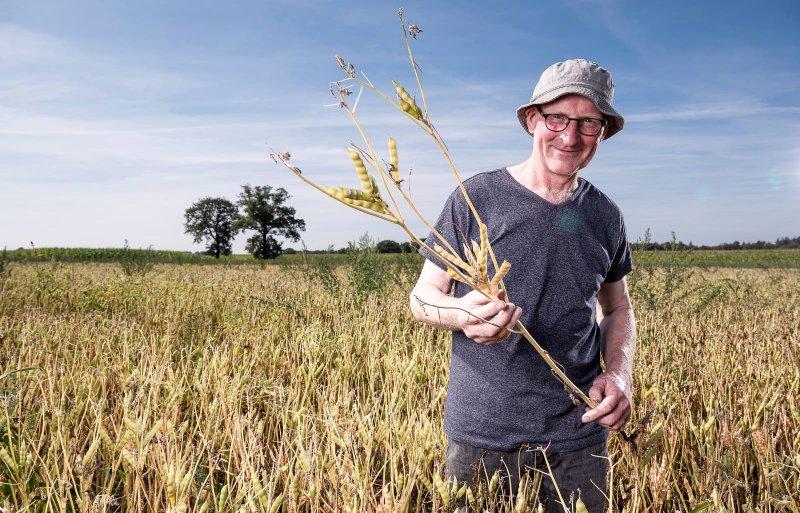Farmers in the Limburg and Brabant Peel region are experimenting with the cultivation of lupine. From the project 'LuPeel' they want to cash in on the opportunities this crop offers. There are still steps to be taken, including in the area of marketing.
Photo: © John Peters
Jos and Lea Keijzers from Liessel in Brabant gained experience with growing lupine for the first time last year. We decided to experiment with this protein crop because we wanted to change our growing plan. Now we still grow mainly corn for our dairy goats, but eventually we are going to stop this business'says Jos Keijzers;
'Then we don't want to sell or rent out our land, but start growing other types of distinctive crops, among other things to preserve the variety of crops in the landscape and strengthen biodiversity and soil quality. Lupin cultivation fits perfectly into this picture and is a nice addition to our rotation schedule. But simple cultivation is not.'
Fungal problems
Indeed, last year Keijzers' entire crop was lost due to fungal problems and high weed pressure. This year, the lupine on the Brabander's plots is in better shape. It is expected that at least lupin beans can be harvested in September.
"There is a lot of interest in getting started with homegrown proteins"
'We now have certified seed, which is free of the Anthracnose fungus, and the problems with weeds are also less than last year. We hope to be able to market the lupin beans soon through the 'LuPeel' project. Growing lupine is pioneering, in all respects', the grower believes.
Encouraging innovations
The initiative 'LuPeel', to which Keijzers is affiliated, was set up in 2019 from a collaboration between Henk Kerkers of Bijzonder Brabants and Innovation House de Peel. This network organization, active in six Brabant Peel municipalities, focuses on stimulating innovations in the agricultural sector, among others.
'Kerkers asked if we could help put lupin cultivation further on the map in the Peel. From soil to mouth, from cultivation to sales. This also means that we are looking for cooperation with many parties: at the cultivation level, in the field of education and research and in the chain' says project leader Liza Simons of Innovatiehuis de Peel.
New rotational crops
'The initiative is now supported from the project 'Connected Peel Trial Gardens for Smart Rotational Crops', in which new rotational crops for sandy soils are developed. New crops, such as lupin and field bean, play a key role in this', says Simons.
'In this project, parties from the regions of Northeast Brabant, Southeast Brabant and Limburg are working together. Among them are also the LLTB and AgriFood Capital. 'LuPeel'is therefore truly a cross-provincial project, focusing on the Limburg and Brabant Peel. The sandy soils in the Peel lend themselves perfectly to the cultivation of lupin', says the project leader.
Soil Quality
According to Simons, lupin is also interesting for farmers in the Peel for other reasons. For example, this crop is good for soil quality. It also benefits biodiversity. Lupin attracts many insects when flowering and fits well in a rotation plan', she explains.
'In addition, it is a high-protein crop. It fits in perfectly with the recently signed Green Deal Protein-rich Crops and the Bean Deal, aimed at stimulating the cultivation and consumption of proteins from Dutch soil.'
Seven growers are affiliated with the 'LuPeel' project, growing 10 hectares of lupine together. Lupin is also grown at the PPO site in Vredepeel, the AgroProeftuin de Peel trial site in Zeeland and at the former Floriade site in Venlo.
Crop groups
'To gain more knowledge about the crop and to increase the yield per hectare, growers are guided in crop groups. Here we work together with the Louis Bolk Institute and Wageningen University & Research. Hopefully more growers will join in, so we can achieve a further growth of lupin cultivation in the Peel' says the project leader.
From the project 'LuPeel' there is also an attempt to set up a marketing chain for the product of the connected growers. This is done in various ways. Together with product developers, colleges such as the HAS University of Applied Sciences and Avans University of Applied Sciences and a cookery school, for example, we are looking at which recipes and products can be developed with lupine' says Simons.
'We are also making contacts with manufacturers and producers who can start making these products. This year we want to make decisions about which lupine-based products we will put on the market. There is a lot of interest from market parties to start working with protein from our own soil. Because of this, lupin also has the potential to provide a good earnings model for farmers.'
Short chain
'To make lupin cultivation profitable in the Netherlands, our lupin must yield considerably more than foreign product. To achieve that, a short chain is important' Keijzers believes.
'In addition, the question arises of how we can justify that higher price. Is the fact that you are growing a protein crop and therefore stimulating soil quality and biodiversity enough? Or do you as a grower have to go the extra mile in other areas as well, adjust your operational management? We still have to have that discussion with each other.'
Source: newharvest
